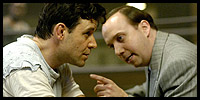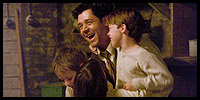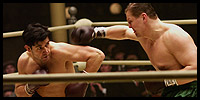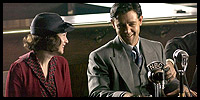
 |
|
Cinderella Man (2005) Cast: Russell Crowe, Renee Zellweger, Paul Giamatti, Craig Bierko, Bruce McGill, Paddy Considine, Connor Price, Rosemarie DeWitt, Patrick Louis, Ariel Waller, Chuck Shamata, Clint Howard, Rance Howard 2005 – 144 minutes Rated: Reviewed by Dustin Putman, June 1, 2005.  Sports dramas about underdogs overcoming all odds to achieve the thought-to-be indomitable is an oft-traveled genre. Narrowing it down even further, boxing dramas about underdogs overcoming all odds to achieve the thought-to-be indomitable isn't even something new. 1980's "Raging Bull" and 2004's "Million Dollar Baby" used these conventions and then skewered them enough to defy expectations, making their particular stories feel crisp and new. "Cinderella Man," directed by Ron Howard (2001's "A Beautiful Mind") in full-on feel-good, emotionally manipulative mode, holds no such scrutiny, content to play itself out like countless other films of its ilk. The results are well-acted, but not nearly as cheer-inducing as one might expect; the plot and characters almost always seem to just be going through the paces.
Sports dramas about underdogs overcoming all odds to achieve the thought-to-be indomitable is an oft-traveled genre. Narrowing it down even further, boxing dramas about underdogs overcoming all odds to achieve the thought-to-be indomitable isn't even something new. 1980's "Raging Bull" and 2004's "Million Dollar Baby" used these conventions and then skewered them enough to defy expectations, making their particular stories feel crisp and new. "Cinderella Man," directed by Ron Howard (2001's "A Beautiful Mind") in full-on feel-good, emotionally manipulative mode, holds no such scrutiny, content to play itself out like countless other films of its ilk. The results are well-acted, but not nearly as cheer-inducing as one might expect; the plot and characters almost always seem to just be going through the paces.
 "Cinderella Man" is based on the true story of Jim J. Braddock (Russell Crowe), a working-class New Jersey man struggling and failing to make ends meet for his family during the Great Depression of the 1930s. Once a respected middleweight champion, Jim sees his boxing career fall by the wayside after a hand injury and a series of losses, much to he and steadfast manager Joe Gould's (Paul Giamatti) frustration. Determined to regain the glory and financial comfortability he once had, Jim finds himself going up against heavyweight champion Max Baer (Craig Bierko) at Madison Square Garden in the summer of 1935. Max, who has killed two people in the ring, means near-certain defeat for Jim, a fact that deeply worries his wife, Mae (Renee Zellweger). As the match moves closer, Jim becomes a symbol of hope and inspiration for his down-on-its-luck neighborhood, with citizens rallying behind his courage and well-meaning cause.
"Cinderella Man" is based on the true story of Jim J. Braddock (Russell Crowe), a working-class New Jersey man struggling and failing to make ends meet for his family during the Great Depression of the 1930s. Once a respected middleweight champion, Jim sees his boxing career fall by the wayside after a hand injury and a series of losses, much to he and steadfast manager Joe Gould's (Paul Giamatti) frustration. Determined to regain the glory and financial comfortability he once had, Jim finds himself going up against heavyweight champion Max Baer (Craig Bierko) at Madison Square Garden in the summer of 1935. Max, who has killed two people in the ring, means near-certain defeat for Jim, a fact that deeply worries his wife, Mae (Renee Zellweger). As the match moves closer, Jim becomes a symbol of hope and inspiration for his down-on-its-luck neighborhood, with citizens rallying behind his courage and well-meaning cause.
 The real-life story and people behind "Cinderella Man" are precisely one of its biggest problems. As directed by Ron Howard and written by Akiva Goldsman (2004's "I, Robot") and Cliff Hollingsworth, the film abides so closely to cliches that, cinematically speaking, all tension is rendered mute. Even for viewers who are unfamiliar with the particulars of Jim Braddock's life portrayed here, no one will be receiving a medal for realizing almost immediately where the plot is going and how it is going to get there; the so-called crowd-pleasing ending is glaringly obvious. This wouldn't be such a hindrance if there was energy and grit to the boxing sequences, but they come off as afterthoughts placed next to the breathlessly riveting fights seen in "Million Dollar Baby." The rousing, if derivative, music score by Thomas Newman (2004's "Lemony Snicket's A Series of Unfortunate Events") tries with all its might, but cannot make up for the watered-down, surprisingly non-violent boxing depictions on display.
The real-life story and people behind "Cinderella Man" are precisely one of its biggest problems. As directed by Ron Howard and written by Akiva Goldsman (2004's "I, Robot") and Cliff Hollingsworth, the film abides so closely to cliches that, cinematically speaking, all tension is rendered mute. Even for viewers who are unfamiliar with the particulars of Jim Braddock's life portrayed here, no one will be receiving a medal for realizing almost immediately where the plot is going and how it is going to get there; the so-called crowd-pleasing ending is glaringly obvious. This wouldn't be such a hindrance if there was energy and grit to the boxing sequences, but they come off as afterthoughts placed next to the breathlessly riveting fights seen in "Million Dollar Baby." The rousing, if derivative, music score by Thomas Newman (2004's "Lemony Snicket's A Series of Unfortunate Events") tries with all its might, but cannot make up for the watered-down, surprisingly non-violent boxing depictions on display.
 The fresher, more interesting sections of "Cinderella Man" are the struggles Jim and Mae face in Depression era New Jersey, when having a shipping job for just a single day is far from guaranteed, food is scarce for themselves and their three moppet children, and the bitter cold of the winter season poses a dangerous threat to the health of their kids. As predictable and tediously routine as the sports scenes are, director Ron Howard gets just right the family moments and their uncertain financial woes, painting them with a stark, effective hand. As Mae Braddock, who stands by husband Jim even as she fears for him, Renee Zellweger (2004's "Bridget Jones: The Edge of Reason") manages to be very good even as she has to recite some corny dialogue and is strapped with a typical "wife" part, exhibiting the love and sacrifice a mother is willing to give in order for her children to have a better life.
The fresher, more interesting sections of "Cinderella Man" are the struggles Jim and Mae face in Depression era New Jersey, when having a shipping job for just a single day is far from guaranteed, food is scarce for themselves and their three moppet children, and the bitter cold of the winter season poses a dangerous threat to the health of their kids. As predictable and tediously routine as the sports scenes are, director Ron Howard gets just right the family moments and their uncertain financial woes, painting them with a stark, effective hand. As Mae Braddock, who stands by husband Jim even as she fears for him, Renee Zellweger (2004's "Bridget Jones: The Edge of Reason") manages to be very good even as she has to recite some corny dialogue and is strapped with a typical "wife" part, exhibiting the love and sacrifice a mother is willing to give in order for her children to have a better life.
 Though Zellweger and Paul Giamatti, coming off of a standout starring turn in 2004's "Sideways," lend strong support, this is Russell Crowe's (2003's "Master and Commander: The Far Side of the World") to own, and he, as usual, does not disappoint. Crowe has a way of transforming into his characters, rather than just playing them, and his wholly convincing, dedicated performance as Irish-American boxer Jim Braddock is no exception. In acting, Crowe will never be seen going for the obvious emotions, all the while blessing his roles with the emotion needed to do them justice. In this way, he and the more traditionally mainstream Ron Howard are an awkward match (they previously worked together on "A Beautiful Mind"), as every time Crowe aims for the naked truth of situations, he is stunted by Howard's overt sentimentality.
Though Zellweger and Paul Giamatti, coming off of a standout starring turn in 2004's "Sideways," lend strong support, this is Russell Crowe's (2003's "Master and Commander: The Far Side of the World") to own, and he, as usual, does not disappoint. Crowe has a way of transforming into his characters, rather than just playing them, and his wholly convincing, dedicated performance as Irish-American boxer Jim Braddock is no exception. In acting, Crowe will never be seen going for the obvious emotions, all the while blessing his roles with the emotion needed to do them justice. In this way, he and the more traditionally mainstream Ron Howard are an awkward match (they previously worked together on "A Beautiful Mind"), as every time Crowe aims for the naked truth of situations, he is stunted by Howard's overt sentimentality.
 There will be those critics and audiences who will no doubt embrace "Cinderella Man," hungry for anything resembling an adult drama free of fart jokes and talking animated animals. But what, exactly, is so special about this one, which basically tells the same story with the same plot developments as too many other sports films to count? It doesn't help that, at nearly two and a half hours, the picture runs out of steam by the halfway point, its wheels creaking as it heads toward a climax set at the Madison Square Garden boxing match that doesn't treat viewers to any surprises in exchange for their dedication of time in watching the movie. "Cinderella Man" is but a worn-out Goodwill version of "Rocky" that either deserved a less-banal filmmaking approach or didn't need to be made at all.
There will be those critics and audiences who will no doubt embrace "Cinderella Man," hungry for anything resembling an adult drama free of fart jokes and talking animated animals. But what, exactly, is so special about this one, which basically tells the same story with the same plot developments as too many other sports films to count? It doesn't help that, at nearly two and a half hours, the picture runs out of steam by the halfway point, its wheels creaking as it heads toward a climax set at the Madison Square Garden boxing match that doesn't treat viewers to any surprises in exchange for their dedication of time in watching the movie. "Cinderella Man" is but a worn-out Goodwill version of "Rocky" that either deserved a less-banal filmmaking approach or didn't need to be made at all.
|
© 2008 by Dustin Putman |














